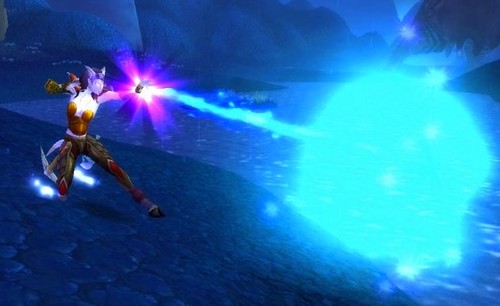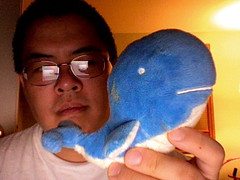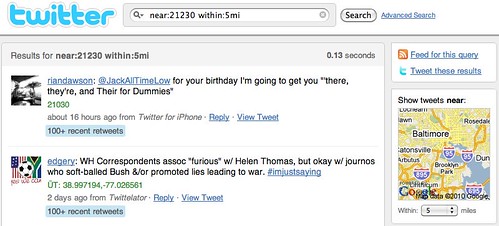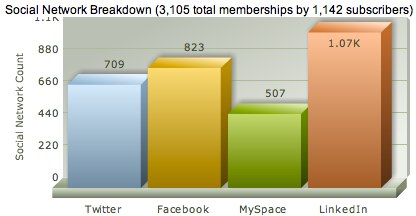Strengths, weaknesses, tanks, DPS
I asked on Twitter the other day:
“Assume you can do only one. Do you enhance your strengths or mitigate your weaknesses? Why?”
The responses were amazing and overwhelming.
BrianneVillano: @cspenn Enhance strengths so you can excel@something. Otherwise, you are working towards mediocrity.
bryanrhoads: @cspenn Strengths! analogy – Jordan would always be avg baseball player – his strength is basketball – be the best!
bryanwp: @cspenn I prefer to mitigate weakness. Its the weakness that can bring you down. Strength can only help you. What about you?
bryanwp: @cspenn mitigate weakness. The weakness is what can bring you down in a time need. What about you?
christinainge: @cspenn Enhance strengths-no one is without weaknesses, and many times, they lead to growth, if your strengths are there.
djwaldow: @cspenn Easy. Enhance strengths. Bigger payoff to be best at something than so-so. I’m a big believer in focusing on what you are good at
dvautier: @cspenn Mitigate weaknesses. Strengths will shine no matter what, weaknesses are opportunities to learn, change & create a new strength
EQGal: @cspenn Enhance your Strengths! For me the Gallup research supports what just seems to make sense…the positive way to BE!
findenlake: @cspenn Weaknesses. It’s all about working from a solid foundation. A weakness can hurt you more than An average attribute.
hoovers: @jsandford @cspenn Enhance your strengths. But context is key. (I wrote on this here: https://is.gd/cLwj9 (expand) )
jayjaboneta: @cspenn focus on enhancing my strengths according to Marcus Buckingham.
jeremymeyers: @tamadear @teresabasich @cspenn but strengthening strengths implies that they’re not yet good enough, no?
joeshartzer: Stronger strengths make you better. RT @cspenn: Assume you can do only one. Do you enhance your strengths or mitigate your weaknesses? Why?
jsandford: @cspenn Def. mitigate weaknesses; that doesn’t imply “Jack of All Trades, Master of None”, though. Your strengths will still be just that.
kimjinwhan: @cspenn I will stronger than before, if I enhence my strength. And it will covers my weakness.
LeanneStewart: RT @RobHatch: @cspenn Strengths, always strengths. Focus on those for yourself and others, they are the means for addressing weaknesses.
mckra1g: @cspenn Enhance strengths bc what we focus on expands. Knowledge of our weaknesses *is* a strength FWIW. Most r oblivious to theirs.
MKMartin: @cspenn Focus on mitigating weaknesses. “The gem cannot be polished without friction, nor man perfected without trials.”
pammcallister: Strengths. Works better, easier. RT @cspenn Assume you can do only one. Do you enhance your strengths or mitigate your weaknesses? Why?
RobHatch: @cspenn Strengths, always strengths. Focus on those for yourself and others, they are the means for addressing weaknesses.
sandrapakosh: @cspenn I build on my strengths… even the lesser ones… while learning lessons.
smallbizhowto: RT @cspenn: Assume you can do only one. Do you enhance your strengths or mitigate your weaknesses? Why?
StevenSchlagel: RT @cspenn: Assume you can do only one. Do you enhance your strengths or mitigate your weaknesses? Why?
tamadear: @cspenn Strengthening strengths almost always mitigates weaknesses by default. The reverse, however, is not often so.
tamadear: @TeresaBasich @cspenn Strengthening strengths is an action of building. Mitigation is patching and filling holes….
TeresaBasich: @cspenn Enhance your strengths. Positive focus and effort into what you’re good at helps mitigate weaknesses by default.
TeresaBasich: @cspenn Interesting observation: Men seem to be about weakness mitigation; women seem to be about focusing on strengths. Biology?
Here’s the catch: the question is somewhat false, or at the very least has a catch. Let me introduce you to two concepts from World of Warcraft, tanks and DPS. (for the purposes of this discussion, we’ll group healers in with DPS, for those that know the game)
 In the video game, tanks are a type of character that stand in front of packs of monsters and get beaten up so that other players on the team don’t. They protect spellcasters and healers, letting them do their jobs. As a result, tanks have to balance their survivability – a measure of how resilient they are to getting beaten up – and threat, or how much attention they can generate from bad guys, so that the bad guys don’t turn their attention elsewhere.
In the video game, tanks are a type of character that stand in front of packs of monsters and get beaten up so that other players on the team don’t. They protect spellcasters and healers, letting them do their jobs. As a result, tanks have to balance their survivability – a measure of how resilient they are to getting beaten up – and threat, or how much attention they can generate from bad guys, so that the bad guys don’t turn their attention elsewhere.
In the video game, DPS (damage per second) are a type of character that zap, shoot, burn, freeze, or otherwise cause damage to the bad guys. Their sole job is to kill the bad guys as fast as possible before the tank succumbs to the bad guys.
When it comes to managing the various attributes of these character archetypes, DPS have it easy. They MUST emphasize their strength – the amount of damage they can do – to the exclusion of nearly everything else. If DPS are bad at what they do, the bad guys will win because the tank will die, and then the bad guys will beat up the DPS and kill them off quickly, spectacularly, and humorously.
When it comes to managing the various attributes of tanks – that’s a different story. For tanking, you have to balance and mitigate your weaknesses first and foremost because yours is a job of endurance. If your armor is weak, if your gear isn’t up to scratch, you have low stamina, which means you die faster. If your weapons are weak and you don’t know what you’re doing with all the buttons to press, you don’t generate enough threat, and the DPS get eaten first. Whichever is your weakest area is the area you must address first in order to provide maximum survivability to your group. (those who are tanks know all about defense cap, melee hit cap, stamina, avoidance, EH, dodge, parry, block, etc.)
The answer, to the extent that there is an answer, about whether to emphasize strength or mitigate weakness depends on what you have to do. If you’re in a marketing department and your job is to generate content, then you have a very focused function to perform and everything and anything you can do to make yourself a better content generator will show very quickly. The results you generate will dramatically improve even with just a few small improvements. You’re effectively in a DPS role.
Suppose, however, you’re in a marketing department and your job is defensive SEO, protecting your web properties from competitors. Suddenly it’s not just about generating content – now you’re mitigating weaknesses in page structure, managing keyword lists, trying to build links, and trying to steal away link juice from competitors. Rather than aggressively go after one small area, you have to mitigate the weakest areas of your SEO strategy first, then slowly build up strength across the board. Too much strength in any one area inherently leaves other areas weak and open to competitors to attack you. You’re effectively in a tanking role.
Which is best? Neither. Any experienced World of Warcraft player will tell you that a bad tank leads to failure, and bad DPS leads to failure just as easily. They’re symbiotic and collaborative. The toughest part for you as a Warcraft player or business person is knowing which role you’re in and doing it well.
Did you enjoy this blog post? If so, please subscribe right now!



Get this and other great articles from the source at www.ChristopherSPenn.com! Want to take your conference or event to the next level? Book me to speak and get the same quality information on stage as you do on this blog.




 On June 30, 2010, Twitter will change forever. For many of you, your favorite widgets, sites, clients, and applications will shatter. Twitter will simply stop working for you in the way you’re used to.
On June 30, 2010, Twitter will change forever. For many of you, your favorite widgets, sites, clients, and applications will shatter. Twitter will simply stop working for you in the way you’re used to. In the video game, tanks are a type of character that stand in front of packs of monsters and get beaten up so that other players on the team don’t. They protect spellcasters and healers, letting them do their jobs. As a result, tanks have to balance their survivability – a measure of how resilient they are to getting beaten up – and threat, or how much attention they can generate from bad guys, so that the bad guys don’t turn their attention elsewhere.
In the video game, tanks are a type of character that stand in front of packs of monsters and get beaten up so that other players on the team don’t. They protect spellcasters and healers, letting them do their jobs. As a result, tanks have to balance their survivability – a measure of how resilient they are to getting beaten up – and threat, or how much attention they can generate from bad guys, so that the bad guys don’t turn their attention elsewhere.


 One of my lists
One of my lists
